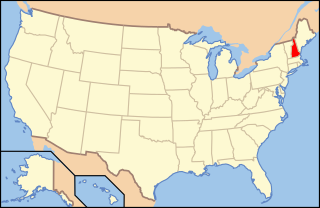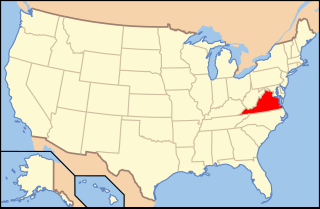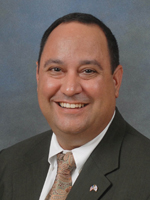
The rights of lesbian, gay, bisexual, and transgender (LGBT) people in the U.S. state of Utah have significantly evolved in the 21st century. Protective laws have become increasingly enacted since 2014, despite the state's reputation as socially conservative and highly religious. Same-sex marriage has been legal since the state's ban was ruled unconstitutional by federal courts in 2014. In addition, statewide anti-discrimination laws now cover sexual orientation and gender identity in employment and housing, and the use of conversion therapy on minors is prohibited. In spite of this, there are still a few differences between the treatment of LGBT people and the rest of the population, and the rights of transgender youth are restricted.

Lesbian, gay, bisexual, and transgender (LGBT) persons in the U.S. state of New Hampshire enjoy the same rights as non-LGBT residents, with most advances in LGBT rights occurring in the state within the past two decades. Same-sex sexual activity is legal in New Hampshire, and the state began offering same-sex couples the option of forming a civil union on January 1, 2008. Civil unions offered most of the same protections as marriages with respect to state law, but not the federal benefits of marriage. Same-sex marriage in New Hampshire has been legally allowed since January 1, 2010, and one year later New Hampshire's civil unions expired, with all such unions converted to marriages. New Hampshire law has also protected against discrimination based on sexual orientation since 1998 and gender identity since 2018. Additionally, a conversion therapy ban on minors became effective in the state in January 2019. Effective from January 1, 2024, the archaic common-law "gay panic defence" will formally be abolished - by legislation implemented within August 2023.

House Bill 444 was a 2009 bill of the Hawaii State Legislature, passed in April 2010 and vetoed by Governor of Hawaii Linda Lingle, that would have legalized civil unions for couples in the state of Hawaii. Its legislative process was accompanied by controversy over the bill's content and effects and rallies were held by supporters and opponents.

Illinois is seen as one of the most progressive states in the United States in regard to lesbian, gay, bisexual and transgender (LGBT) rights and often viewed as one of the most liberal states in the Midwestern United States. Same-sex sexual activity has been legal since 1962, after Illinois became the first U.S. state to repeal its sodomy laws. Same-sex marriage was banned by statute in 1996, but has since been legalized after a law allowing such marriages was signed by Governor Pat Quinn on November 20, 2013 and went into effect on June 1, 2014. Civil unions have been recognized since 2011, and same-sex couples are also allowed to adopt. Additionally, discrimination on the basis of sexual orientation and gender identity is banned in employment, housing, credit and public accommodations, and conversion therapy on minors has been outlawed since 2016.

Lesbian, gay, bisexual, and transgender (LGBT) people in the U.S. state of Oregon have the same rights and responsibilities as non-LGBT people. Same-sex sexual activity is legal in Oregon, and same-sex marriage has been legal in the state since May 2014 when a federal judge declared the state's ban on such marriages unconstitutional. Previously, same-sex couples could only access domestic partnerships, which guaranteed most of the rights of marriage. Additionally, same-sex couples are allowed to jointly adopt, and discrimination based on sexual orientation and gender identity in the areas of employment, housing and public accommodations is outlawed in the state under the Oregon Equality Act, enacted in 2008. Conversion therapy on minors is also illegal.

Lesbian, gay, bisexual, and transgender (LGBT) people in Texas have some protections in state law but may face legal and social challenges not faced by others. Same-sex sexual activity was decriminalized in the state in 2003 by the Lawrence v. Texas ruling. On June 26, 2015, the Supreme Court of the United States ruled bans on same-sex marriage to be unconstitutional in Obergefell v. Hodges.

Lesbian, gay, bisexual, and transgender (LGBT) persons in the U.S. state of Indiana enjoy most of the same rights as other people. Same-sex marriage has been legal in Indiana since October 6, 2014, when the U.S. Supreme Court refused to consider an appeal in the case of Baskin v. Bogan.

Lesbian, gay, bisexual, and transgender (LGBT) people in the Commonwealth of Virginia enjoy the same rights as non-LGBT persons. LGBT rights in the state are a recent occurrence with most improvements in LGBT rights occurring in the 2000s and 2010s. Same-sex marriage has been legal in Virginia since October 6, 2014, when the U.S. Supreme Court refused to consider an appeal in the case of Bostic v. Rainey. Effective July 1, 2020, there is a state-wide law protecting LGBT persons from discrimination in employment, housing, public accommodations, and credit. The state's hate crime laws also now explicitly include both sexual orientation and gender identity.

Lesbian, gay, bisexual, and transgender (LGBT) persons in the U.S. commonwealth of Kentucky still face some legal challenges not experienced by other people. Same-sex sexual activity is legal in Kentucky. Same-sex couples and families headed by same-sex couples are not eligible for all of the protections available to opposite-sex married couples. On February 12, 2014, a federal judge ruled that the state must recognize same-sex marriages from other jurisdictions, but the ruling was put on hold pending review by the Sixth Circuit. Same sex-marriage is now legal in the state under the U.S. Supreme Court ruling in Obergefell v. Hodges. The decision, which struck down Kentucky's statutory and constitutional bans on same-sex marriages, and all other same sex marriage bans elsewhere in the country, was handed down on June 26, 2015.

Raymond Wesley Rodrigues is the 12th chancellor of the State University System of Florida since 2023. Previously, he served four terms in the Florida House of Representatives, representing southern and coastal Lee County from 2012 to 2020 and one term in the Florida Senate from 2020 to 2022. His campaign website describes him as conservative.

A six-week abortion ban, also called a "fetal heartbeat bill" by proponents, is a law in the United States which makes abortion illegal as early as six weeks gestational age, which is when proponents falsely claim that a "fetal heartbeat" can be detected. Medical and reproductive health experts, including the American Medical Association and the American College of Obstetricians and Gynecologists, say that the reference to a fetal heartbeat is medically inaccurate and intentionally misleading because a conceptus is not called a fetus until eight weeks after fertilization, as well as that at four weeks after fertilization, the embryo has no heart, only a group of cells which will become a heart. Medical professionals advise that a true fetal heartbeat cannot be detected until around 17 to 20 weeks of gestation when the chambers of the heart have become sufficiently developed.

Eric Joseph Holcomb is an American politician who is the 51st and current governor of Indiana, serving since 2017. A member of the Republican Party, he served as the 51st lieutenant governor of Indiana from 2016 to 2017 under Governor Mike Pence, who left the governorship in 2017 to become the vice president of the United States. Holcomb was nominated to fill the remainder of Lieutenant Governor Sue Ellspermann's term after she resigned on March 2, 2016, to become president of Ivy Tech Community College. He won the 2016 election for governor of Indiana over Democratic nominee John R. Gregg. Holcomb was reelected in 2020 over Democratic nominee Woody Myers and Libertarian nominee Donald Rainwater.

Cannabis in Indiana is illegal for recreational use, with the exception of limited medical usage. Possession of any amount is a Class B misdemeanor, punishable by up to 180 days in prison and a fine of up to $1000.
South Dakota House Bill 1008, also known as House Bill 1008, HB 1008, and the Bathroom Bill, was a bill passed by the South Dakota Legislature in 2016 and vetoed by Governor of South Dakota Dennis Daugaard. The purpose of the bill was to restrict bathroom and locker room use by transgender students to facilities that matched their sex assigned at birth, not their gender identity. It was the first such bathroom bill to be passed in a state legislature in the U.S. and sparked a chain of similar bills across the nation. HB 1008 was opposed by several LGBT rights organizations, such as the HRC, GLSEN, and ACLU.

Anti-LGBT curriculum laws, sometimes referred to as "Don't Say Gay" laws, or no promo homo laws, are laws approved by various U.S. states that prohibit or limit the mention or discussion of homosexuality and transgender identity in public schools, especially in younger grades. In theory, these laws mainly apply to sex ed courses, but they can also be applied to other parts of the school curriculum as well as to extracurricular activities such as sports and organizations such as gay–straight alliances. In July 2022, a wave of anti-LGBT curriculum resurgence saw ten such laws beginning to take effect in six different states. Some states enacting these new laws appear to have mirrored similar laws from other states.

Arkansas House Bill 1570, also known as the Save Adolescents From Experimentation (SAFE) Act or Act 626, is a 2021 law in the state of Arkansas that bans gender-affirming medical procedures for transgender people under 18, including puberty blockers, hormone therapy, and sex reassignment surgery. The law also bans the use of public funds for and prohibits insurance from covering gender transition procedures, while doctors who provide treatment in violation of the ban can be sued for damages or professionally sanctioned. The measure makes Arkansas the first U.S. state to make gender-affirming medical care illegal.

The Parental Rights in Education Act, commonly referred to as the "Don't Say Gay" law, is a Florida state law passed in 2022 that regulates public schools in Florida. The law is most notable for its controversial sections which prohibit public schools from having "classroom discussion" or giving "classroom instruction" about sexual orientation or gender identity from kindergarten through third grade or in any manner deemed to be against state standards in all grades; prohibits public schools from adopting procedures or student support forms that maintain the confidentiality of a disclosure by a student, including of the gender identity or sexual orientation of a student, from parents; and requires public schools to bear all the costs of all lawsuits filed by aggrieved parents.
Indiana HB 1041 is a bill which bars transgender girls from participating in women's sports teams in K-12 schools. The bill passed the state House on January 27, 2022, and Senate on March 1, 2022. Governor Eric Holcomb vetoed the bill on March 21, 2022, and the veto was overridden on May 24, 2022. The legislation garnered controversy with prominent organizations like the ACLU and the Human Rights Campaign publicly opposing this bill.
Indiana Senate Bill 480 introduced into the Indiana General Assembly in 2023. The bill prohibits physicians from providing gender affirming care to minors. The bill passed the state Senate on February 28, 2023, and the House on March 27, 2023. Governor Eric Holcomb signed the bill on April 5, 2023.
















